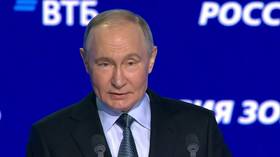Pskov: Russia's land of mystery
The Pskov Region's striking natural beauty and ancient religious monuments give it supernatural powers of transformation. At least, that's what many Russians believe.
Muscovite Yulia has it all: looks, money and a good career. But the one thing missing is a man in her life. Praying to the miracle-working icon of the Pure Virgin Mary is reputed to have helped many find a match throughout the centuries.
“In front of the icon I felt like I was in a cocoon, and capable of communicating with another world. All I have to do now is believe,” Yulia maintains.
Yulia says she's keen to get back to Moscow as soon as possible to see if her fortunes change.
And there are forces here in the Pskov region that can help you go one step further, if you're prepared to look beyond the world of Christianity and into the occult.
According to legend, if a barren woman touches it the Idol of Sebezh, she will become fertile.
Its magic properties were noticed as every year the stone would grow by several centimeters – at least before it was excavated and put in the local museum.
After getting married, Svetlana Kuskova paid a visit to the idol. Soon after, she gave birth to twins.
“Isn't this a miracle?” she marvels.
“Two twin boys. Nobody else in our family has had anything like this happen to them.”
Pskov's reputation has been a boon for Evgeny Vaghin. He makes lucky charms for specific tasks, according to his customers' wishes. And his trade has been blossoming.
“The blacksmith is the spiritual link between the wish for a good thing, and the object which brings the owner good luck,” Evgeny explains.
So if Stonehenge is just too commercialized and your dreamcatcher no longer works, come to Pskov, where for every wish a magical solution awaits.
A wealthy stronghold of democracy
Apart from being a place where miracles come true, Pskov also has a rich history. Up until the 16th century, the city was a prototype of modern democracy. Anna Bogdanova, a tour guide in Pskov, explains how the best representatives of the male half of the population would assemble at the city’s main square and make keynote decisions.
“They decided by voting on the most important questions for Pskov: to invite a prince or not, to raise taxes or not, to build something or not, even to start or stop a war or not. And they were quite proud to be self-governed and independent,” Anna says.
This system lasted until the beginning of the 16th century, when Pskov became part of the unified Russian state.
Located at the confluence of two rivers, Pskov was not only an impenetrable fortress for hostile forces, but also an indispensable trade route. It was the departure point for traditional Russian goods such as wax, honey and furs and the entry point of foreign goods into the country. Pskov’s merchants were renowned throughout the world for their honesty.
“Representatives of a union of German towns used to say that a Pskov merchant’s word is enough to set the deal,” Anna explains.
A miraculous founding
The foundation of Pskov is linked to the story of a Russian holy princess – Olga. She was a very wise ruler and is considered to have founded Pskov in the middle of the 10th century.
“She looked at the Velikaya River and saw three rays coming down from the sky,” Yulia Kasich, a local tour guide, elaborates.
“Then she predicted that there would be a very glorious town and the trinity cathedral at the spot that she was standing”












